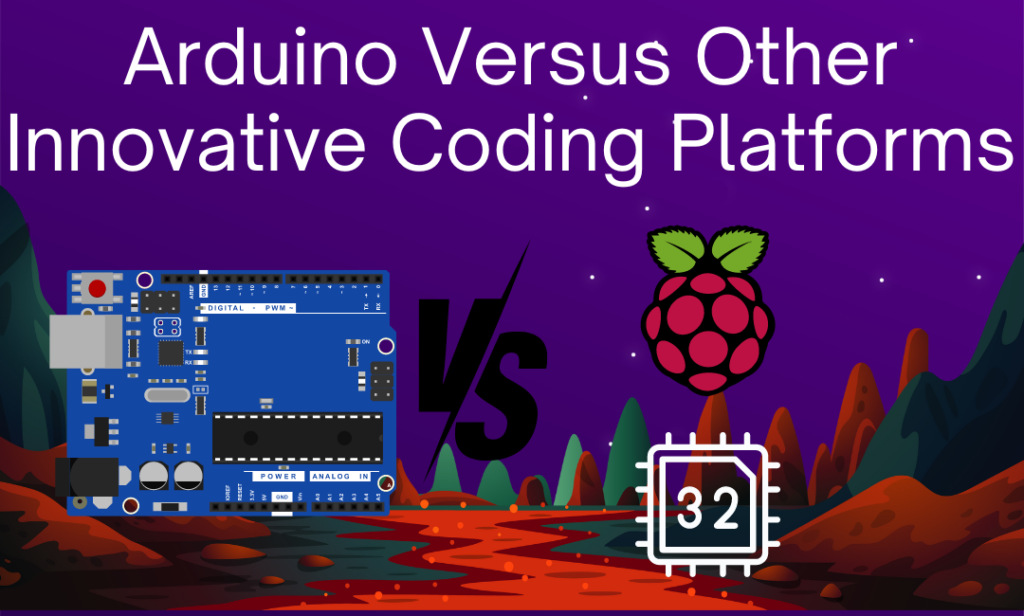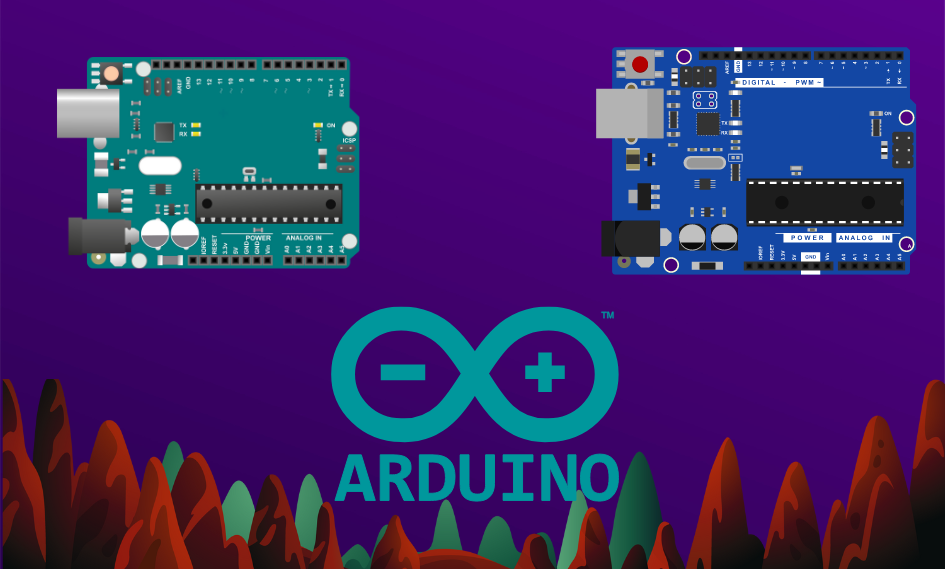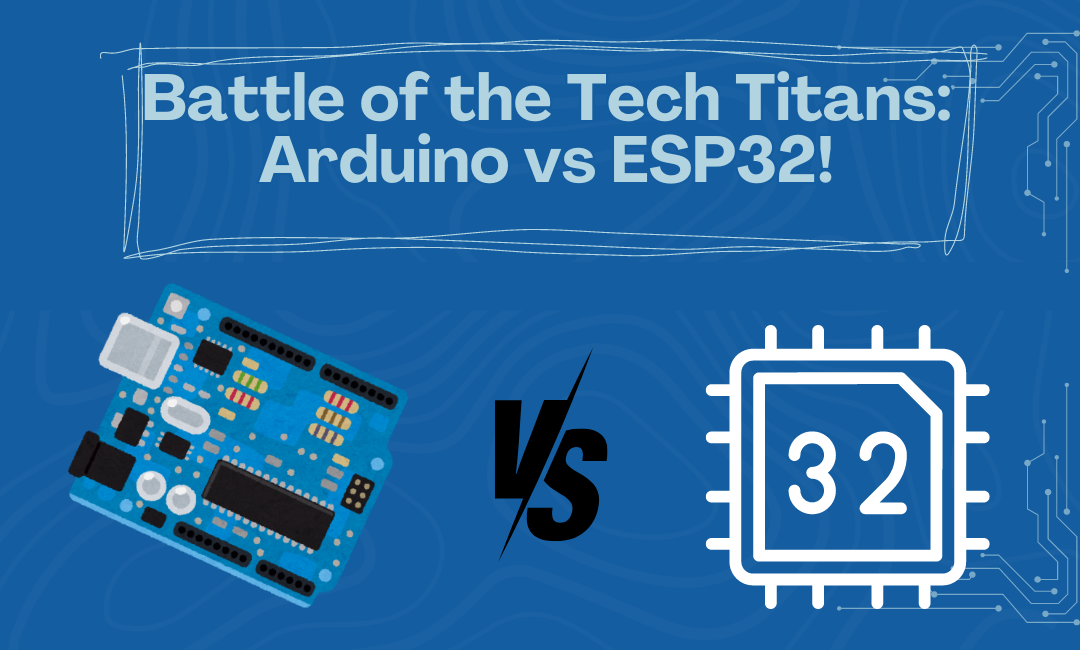When choosing a microcontroller for your next project, the decision often comes down to the requirements of the application, such as connectivity, processing power, and peripheral support. The ESP32 and Arduino boards are two popular choices, each with its strengths and unique features. This article provides a detailed comparison of the ESP32 and Arduino, helping you make an informed decision.
Arduino vs ESP32: starting with ESP32
Overview of ESP32
The ESP32, developed by Espressif Systems, is a low-cost, low-power system on a chip (SoC) with integrated Wi-Fi and Bluetooth capabilities. It’s known for its powerful performance and extensive feature set, making it a favorite among developers, especially for IoT projects.

Key Features of ESP32:
- Processor: Dual-core Tensilica Xtensa LX6 microprocessor.
- Clock Speed: Up to 240 MHz.
- Memory: 520 KB SRAM, up to 4 MB Flash.
- Connectivity: Integrated 2.4 GHz Wi-Fi and Bluetooth (classic and BLE).
- GPIO Pins: 36, with support for ADC, DAC, UART, SPI, I2C, and PWM.
- Operating Voltage: 3.3V.
- Low Power Modes: Multiple sleep modes for power efficiency.
Overview of Arduino
Arduino is an open-source electronics platform based on easy-to-use hardware and software. The most popular Arduino boards include the Arduino Uno, Nano, and Mega, each designed for different levels of complexity and project requirements.

Key Features of Arduino Uno (as a representative example):
- Processor: ATmega328P microcontroller.
- Clock Speed: 16 MHz.
- Memory: 2 KB SRAM, 32 KB Flash.
- Connectivity: No built-in connectivity; requires additional shields for Wi-Fi or Bluetooth.
- GPIO Pins: 14 digital pins (6 PWM), 6 analog inputs.
- Operating Voltage: 5V.
- Power Consumption: Typically higher than ESP32 without power-saving modes.
Detailed Comparison
Processing Power
ESP32:
- Dual-core processor with a maximum clock speed of 240 MHz.
- Significantly more powerful than the Arduino Uno’s 16 MHz single-core processor.
- Suitable for applications requiring high processing power and multitasking capabilities.
Arduino:
- Typically uses an 8-bit microcontroller with a lower clock speed (e.g., 16 MHz on the Arduino Uno).
- Adequate for simple to moderately complex projects but may struggle with more demanding tasks.
Connectivity
ESP32:
- Built-in Wi-Fi and Bluetooth, making it ideal for IoT projects.
- No need for additional shields or modules to add connectivity.
Arduino:
- No built-in Wi-Fi or Bluetooth on most boards (e.g., Arduino Uno).
- Requires additional shields or modules to add wireless connectivity, increasing cost and complexity.
GPIO and Peripherals
ESP32:
- 36 GPIO pins with a wide range of functionalities, including ADC, DAC, UART, SPI, I2C, and PWM.
- More versatile for complex projects with multiple peripherals.
Arduino:
- Fewer GPIO pins (14 on the Arduino Uno), with limited functionalities.
- It is suitable for simpler projects but may require additional components for more complex setups.
Power Consumption
ESP32:
- Designed with power efficiency in mind, featuring multiple sleep modes.
- Suitable for battery-powered and portable applications.
Arduino:
- Generally consumes more power than the ESP32.
- Lacks advanced power-saving modes, making it less ideal for low-power applications.
Development Environment
ESP32:
- Compatible with the Arduino IDE, allowing easy development for those familiar with Arduino.
- Also supports other environments like PlatformIO and ESP-IDF, offering advanced development features.
Arduino:
- It uses the Arduino IDE, which is known for its simplicity and ease of use.
- Excellent for beginners but lacks some advanced features found in other development environments.
Community and Support
ESP32:
- Growing community with extensive resources, tutorials, and libraries.
- Strong support for IoT applications and advanced projects.
Arduino:
- Large and well-established community with a wealth of resources, tutorials, and libraries.
- Ideal for beginners and educational purposes due to its extensive documentation and support.
Use Cases
ESP32 Use Cases:
- IoT Projects: With built-in Wi-Fi and Bluetooth, the ESP32 is perfect for IoT applications, such as smart home devices, remote sensors, and wearable technology.
- Real-Time Data Processing: Its powerful processor and multitasking capabilities make it suitable for real-time data processing and complex algorithms.
- Battery-Powered Devices: The ESP32’s low power modes make it ideal for portable and battery-powered devices.
Arduino Use Cases:
- Educational Projects: The simplicity and ease of use of Arduino make it perfect for educational purposes, teaching electronics and programming to beginners.
- Simple Automation: Great for simple automation tasks like controlling LEDs, motors, and sensors in basic projects.
- Prototyping: Its extensive support and large community make it a good choice for quickly prototyping and testing new ideas.
Conclusion
Both the ESP32 and Arduino have their unique strengths and are suited to different types of projects. The ESP32 excels in connectivity, processing power, and power efficiency, making it a robust choice for advanced and IoT applications. On the other hand, Arduino, with its simplicity and extensive community support, remains a fantastic platform for beginners, educational purposes, and simpler projects.
When choosing between the ESP32 and Arduino, consider the specific requirements of your project, such as the need for wireless connectivity, processing power, and power consumption. By understanding the strengths of each platform, you can select the best microcontroller to bring your ideas to life.
